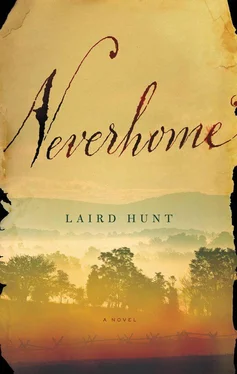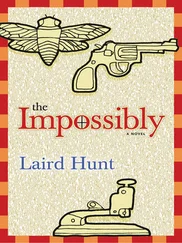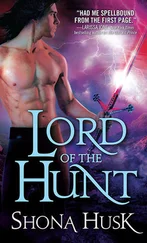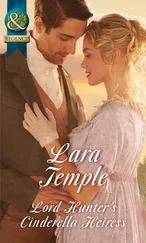“You want to hear about those scores now? I got all kinds of them,” I said after a time.
“We used to kill dogs,” she said.
“Kill dogs?” I said.
“Every one of them we could in those last days. I beat one of those bloodhounds to death with a butter churn.”
I thought about it a minute. It came to me then that I’d heard stories about dogs had had their throats slit on the big spreads, dogs dead the way she’d said and wouldn’t go hunting runaways anymore.
“We ought to go on now, the road is clear,” I said.
She again didn’t answer but there had been a shift in her shoulders and suddenly I didn’t like the look of the size of her as we crouched there in the dark. I tried to stand but the next second I found myself with her knee on my chest and her stick across my throat.
“Tell you what,” she said.

I fought halfway up and she wrestled me back down and got her knee and stick pressed down harder. There’s times part of me likes to think if I hadn’t been fresh out of the slops and ice baths I could have fought her but there’s the other part of me thinks there just wasn’t any way I ever could have.
“You want to share the road, head up north together, we both wore the blue, fought the grays, well, tell you what,” she said.
“Tell you what. It’s a winter’s day. January day. You feel the cold of the ground here, that’s just the swaddling to the cold of the day I’m conjuring. There’s rain coming down, rain like the ropes of the draper man. Ruts and puddles in the barnyard. The one rooster whose neck you haven’t wrung hasn’t crowed day yet. So it’s darker than this dark we got here. It’s black-cold and wet and you got little ones on their pallets and your old mother still dreaming in her chair. Your old mother who never did anything but work and get whipped every day you’ve been alive. Dreaming her dreams. You tell me where she was. Where those dreams had made her go. It’s cold like that and it’s dark like the devil’s teeth and you are awake because you just heard the warning bell. Death is coming down the road to knock on your door and you don’t know what to do. Master’s back after barely a month from the war and Mistress is dead of her bad finger and lies in the dirt next to her dead sons and now he’s coming to bury you. Bury you and your babies and your old mother before he’ll let you go to live with Uncle Lincoln up north. Live in his white house and pluck fruit from his trees. Master and his hired boys are coming. I got two arms and one back. I got three babies and one old mother can’t walk. ‘Run now’ is what my old mother said. She got up long enough to get one of my babies on my back and snug the other two into my arms. ‘Run now,’ she said. My old mother. There was a rise across the yard with bushes like these ones and I went there and I watched them come and pull my old mother out by her hair into the yard. Make her lie down in one of the puddles. Hold her down there in the wet. Hold her down there until she didn’t move. Me carrying three babies. Sitting there watching them drown my mother. Like a rat to spit on. And any minute any one of my babies might cry. And you want to share my road? Hand me a cracker and help me on my way? Tell me stories about some fool captain and some other fool got his pockets swollen shut? Shaves and French perfume?”
“I fought them,” I said, even though that stick at my neck hadn’t budged, even though I couldn’t breathe, even though I thought I was looking up into the eyes of my end.
“Not them, you didn’t,” she said. “You didn’t fight any of that,” she said. “You did not,” she said, putting her face down almost nose to nose with mine, her mouth almost onto mine, her shoulders almost onto my own, “fight any inch of that.”
“Where are your babies?” I said.
“My what?”
“I had a baby once.” I don’t know why I said that to her.
She didn’t answer, just took the knee off my chest and the stick off my neck and set off into the dark woods behind us. Away from the moon-white ribbon of the empty road. Last thing I heard her say as she vanished and I lay there choking up the air could now come back at last into my throat was “Tell you what.”

When I was young, my mother liked to start one story and finish it off with another. Hansel and Gretel would end with Rumpelstiltskin, and the Snow Queen with Mother Hen. I don’t know if she did this to investigate my state of interest or awakeness or because she thought the old tales had gotten played out and she wanted to freshen them up. Sometimes she would put three or four together. Tie them into a bundle and let loose the whole shooting match. Bartholomew claimed to me once he had heard her at this game but I don’t know how he could have since she was dead of her own hand no time at all after he gave me that dark red zinnia I took in the house and pressed and have lying here in its hints of old-time crimson even now. Maybe he dreamed it. Maybe my mother visited him in his sleep. Maybe she talked to him too. Told him about the gingerbread boy ran out of the house and bit an apple and the little man spun gold so the whole kingdom fell asleep, the end.
Whether Bartholomew had dream visitors or sat one night outside our window and heard my mother stitching stories together or he didn’t, I had moments after I left the rebellious states and as I walked and rode my slow way back to our Indiana farm that I thought I had stepped out of one story and into some other. In that other I was now in, the angel of death had not unfurled its wings and blacked out the stars and sent metal and men to shriek together in its awful night wouldn’t ever end. Here where I now walked there were no fields of fresh dead to sink in up to your knees, no bee-stung boys in gray or blue or any of the other colors you could find on the field, no towns entire gone mad, no hot cannon, no dogs beat to death with butter churns. Instead there was a season full of flowers, fields that felt the plow and fat young cows at their grass. Birds swooped the trees and sang the branches. Lee’s try on Pennsylvania was long since just bones for the ages in the fields. Laundry hung sweet on the line. Clocks ticked loud on mantels and told something like the right time.
My hair had grown and I had on Neva Thatcher’s good dress and good shoes and more than one family took me in for a meal. It was times strange enough and they did not ask me why I was abroad. A pair of sisters I dinnered with said they had given soup to a trio of one-armed jugglers not the week before. An old man and woman in a house at the bottom of an apple orchard outside Waynesburg had woken up one morning to find a stove-in mortar abandoned in their barn. Negroes done forever with the South and its yokes were everywhere with their bundles and mules. I thought I recognized my friend from the road one time. But it was some other woman dressed in rag skirts with a calico swaddle in each of her strong arms. Here and there you would cross a discharged veteran still had bombs and bullets flying in his eyes but there was good swaths of the country been emptied out of its men. Didn’t stop the ones who were still there or already back from trying out their tricks and evils, though. It was them more than once let me know my story hadn’t yet slipped its hinges entirely into some other one.
The first time I was just over into eastern Ohio and had been marching a stretch in the rain. Yonder I saw light in a house and I went up and knocked on its door. There was a big fellow with a scar on his forehead come to answer. He told me to step in, step in, said I looked hungry and his wife would get me my supper. The wife looked to be about seventy-five pounds of beat-up bone. She had a bright blue bruise on her cheek and didn’t say a word, only gave out a cringe when the husband pointed a finger at her. When the husband stepped past — to get some cider, he told me, from the shed — she gave me up a hand gesture you didn’t have to work too hard to understand meant run. I stayed long enough to look out the window and see it wasn’t cider he was bringing back from the shed but a standard U.S. military — issue horse pistol and a length of rope. I told the woman she ought to come with me but she just smiled at this, handed me a biscuit, and said she wasn’t worried for herself. I stepped out the kitchen door and trotted off with my biscuit into the dark and rain. I gnawed that biscuit under a lilac bush. The woman had dipped it into some lard and it made a fair meal. As I chewed I thought about her bruise. The rain came down hard through the lilac. I don’t know why I was sitting under it. There is shelter and then there is the idea of shelter. Shore up under the second all you want. You still get wet.
Читать дальше













